Text
ohhh yeah 😂 i often hear my partner voice consonants a bit too much, and the cutest occasion went something like this:
her: I was watching this document about bolar bears--
me: Did you say bolar bears?
her: Yes, about bolar bears and the climate.
me: Bolar bears. Watching a "document" about bolar bears. 🥺😍 Bolar bears.
her: 😑
Has anyone else who speaks Finnish and English noticed how the 'p' and 'b' from English don't work in Finnish and vice versa?
Someone said to me today like 17 times "bussi" and all I could hear was "pussi".
Which is awkward at the best of times.
#documentary#finnish and english#consonants#voiced vs unvoiced#she knows it's documentary in english but doesn't care XD
17 notes
·
View notes
Text
2021 storming of the United States Capitol vocabulary in Finnish

Yhdysvaltain kongressitalo - United States Capitol
Yhdysvallat - United States
Presidentti - president
Vaalit - elections
Vaalivilppi - electoral fraud
Valhe - lie
Salaliitto, juoni, konspiraatio - conspiracy
Mielenosoitus - protest, demonstration, rally
Mellakka - riot
Kapina - rebellion, insurrection
Kapinanlietsonta, kansankiihotus - sedition
Hyökkäys - attack
Vallankaappaus - coup d'état
Terrorismi - terrorism
Maanpetos - treason
Väkivalta - violence
Ilkivalta - vandalism
Tukija - supporter
Seuraaja - follower
Mielenosoittaja - protestor, demonstrator
Mellakoitsija - rioter
Radikalisoitunut - radicalized
Äärioikeistolainen - far-righter
Uusnatsi - neo-nazi
Terroristi - terrorist
Rikollinen - criminal
Kultti - cult
Poliisi - police
Yhdysvaltain keskusrikospoliisi, FBI - FBI
Armeija - military
Fasismi - facism
Rasismi - racism
Valkoinen ylivalta - white supremacy
Epätasa-arvo - inequality
Ase - weapon, gun
Räjähde - explosive
Käsiraudat - handcuffs
Barrikadi - barricade
Konfederaation lippu - Confederate flag
Yllyttää - to incite
Tunkeutua - to invade, to trespass
Murtautua - to break in
Hyökätä - to attack
Valloittaa - to take over, to occupy, to conquer
Päästää sisään - to let in
Vastustaa - to oppose, to resist, to object
Kumota - to overthrow
Estää - to stop, to impede, to prevent, to hinder
Häiritä - to disrupt
Ryöstää - to loot
Varastaa - to steal
Tärvellä - to vandalize
Pelotella - to intimidate
Uhkailla - to threaten
Evakuoida - to evacuate
Pidättää - to arrest
Loukkaantua - to get injured
Kuolla - to die
Irtisanoutua - to resign
Tuomita - to condemn
Jäädyttää tili - to suspend an account
Laskea - to count
Vahvistaa - to verify
Häväistys - dishonour
Häpeä - shame
Uhka demokratialle - threat to democracy
Hyökkäys demokratiaa vastaan - attack on democracy
35 notes
·
View notes
Text
i love that in finland when someone, usually your kid or a loved one is going somewhere we dont say things like “take care”, we say “oo sit ihmisiks” which means “act like a human”
5K notes
·
View notes
Text
Police Brutality vocabulary in Finnish

Based on @iprobablyspeakyourlanguage‘s vocabulary list!
Poliisiväkivalta - police brutality
Väkivalta - violence
Väkivaltainen - violent
Voimankäyttö - use of force
Pahoinpitely - abuse, battery, assault
Valkoinen ylivalta - white supremacy
Rasismi - racism
Rasisti - a racist (person)
Rasistinen - racist
Rakenteellinen rasismi - institutional racism
Syrjintä - discrimination
Eriarvoisuus - inequality
Kokoontuminen - gathering
Mielenosoitus, protesti - protest
Mellakka - riot
Kapina - rebellion
Vastarinta - resistance
Ryöstö - robbery, looting
Poliisi - police
Kansalliskaarti - national guard
Asevoimat - armed forces
Sotilas - soldier
Siviili - civilian
Mielenosoittaja - protester
Mellakoitsija - rioter
Pidätellä - to restrain, to hold
Pidättää - to arrest
Tukehduttaa - to choke someone, to suffocate someone
Lyödä - to hit, to punch
Hakata - to beat up
Ampua - to shoot
Haavoittaa - to wound
Tappaa - to kill
Sytyttää tuleen - to set on fire
Rikkoa - to break
Vahingoittaa - to damage
Varastaa - to steal
Ryöstää - to rob, to loot
Puolustaa itseään - to defend oneself
Suojella - to protect
Olla jtn vastaan - to be against smth, to be opposed to
Osoittaa mieltä - to protest
Ottaa yhteen - to clash
Kuolema - death
Murha - murder
Ase - weapon
Pamppu - baton
Suojakilpi - shield
Kyynelkaasu - tear gas
Pippurikaasu - pepper spray
Polttopullo - molotov cocktail
Kumiluoti - rubber bullet
Tainnutuskranaatti - stun grenade
Käsiraudat - handcuffs
Makuuasento - prone position
Oikeus - right
Oikeudenmukaisuus, oikeus - justice
Tasa-arvo, yhdenvertaisuus - equality
Rauha - peace
Rauhanomainen - peaceful, non-violent
Vetoomus, adressi - petition
En voi hengittää - I can’t breathe
Black Lives Matter - Black Lives Matter
#vocabulary#reading finnish news about police brutality in my country really drives home how messed up it is and how it doesn't have to be this way
78 notes
·
View notes
Text
Nice examples! I enjoy it too, how finnish words make so much sense. When I see an unfamiliar long one, it's exciting to realize I know all the parts and can guess at its meaning. It makes learning basic words seem even more valuable.
English has some elements of this too, if you look for the roots. Like conspiracy is made of con- (with) and -spir (breath), which you can picture as people whispering together. Expedition is made of ex- (out) and -pedi (foot), which suggests going out on foot. If more of these patterns where taught in schools, maybe our education would improve.
Languages are cool \o/
Me realising that the Finnish word for concussion is aivotärähdys (i.e. brain vibration/jolt).... 🤯 I hadn't even realised this thing specifically affected the brain. This led my bf to come up with the conspiracy theory that finnish education system is so "good" because the language is so literal, so everyone understands what is going on. By the way, conspiracy is salaliitto (secret alliance). Another good one is expedition, which is löytöretki (finding trip).
3K notes
·
View notes
Quote
The truth is that entering an intimate relationship with a new language often colours everything. Our eyes expect the new words. Our ears habituate to the new sounds. Our pens memorise the new letters. While the infatuation takes over our senses, the language’s anatomy etches into our brains. Neural pathways are laid, connections are formed. Brain networks integrate. Grey matter becomes denser, white matter gets strengthened. Then, splatters of the new hues begin to show up in letters to grandma. Linguists call this ‘second language interference’, when the new language interferes with the old language, like a new lover rearranging the furniture of your bedroom, as if to say – this is how things will be done around here from now on. Somehow, writing exposes this interference (this betrayal, as grandma saw it) more than speaking ever could. Maybe because, when spoken, our words are at the mercy of our facial expressions and the range of our timbres, as the French author Guy de Maupassant observed; ‘But black words on a white page are the soul laid bare.’
Marianna Pogosyan, “Why learning a new language is like an illicit love affair”
(via linguisten)
1K notes
·
View notes
Text
Joka
Joka is a way of joining two ideas together in the one sentence and is used in place of the English words “who”, “that”, “which”.
However joka needs to be altered to agree with situation, both in terms of singular versus plural, and also the form of the word.
How to form joka in different cases:
1. For singular remove -ka and add the ending.
2. For plural remove -ka and add i and then the ending.
Unfortunately nominative and genitive are exceptions, so just learn these separately.
Sing. Plural
Nominative Joka Jotka
Genitive Jonka Joiden
Partitive Jota Joita
Inessive Jossa Joissa
Elative Josta Joista
Examples
Singular/Basic
Poika, joka saapui eilen, on minun ystäväni.
The boy, who came yesterday, is my friend.
Plural/Basic
Pojat, jotka saapuivat eilen, ovat minun ystäviäni.
The boys, who came yesterday, are my friends.
Singular/Genitive
Tyttö, jonka nimi on Hanna, tulee huomenna.
The girl, whose name is Hanna, comes tomorrow.
Plural/Genitive
Tytöt, joiden nimet ovat Hanna ja Jenni, tulevat huomenna.
The girls, whose names are Hanna and Jenni, come tomorrow.
Singular/Inessive
Kaupunki, jossa minä tapasin sinut, on kaunis.
The city, where I met you, is beautiful.
Lastly, joka (short for jokainen) can be used to mean “every”, such as
joka päivä - every day
joka maassa - in every country
109 notes
·
View notes
Text
Learning a new language is half vocabulary and half confused mumbling.
205 notes
·
View notes
Text
Cozy vocabulary in Finnish

Translated from @malteseboy‘s original post and added a few words!
Suudelma – kiss
Elokuva – movie
Villapaita – sweater
Tyyny – pillow
Kahvi – coffee
Villasukat – woolly socks
Kirja – book
Mukavuus – comfort
Peitto – blanket
Päiväuni – nap
Tuli – fire
Takka – fireplace
Kissa – cat
Lämpö – warmth
Tähdet – stars
Tee – tea
Halaus – hug
Kynttilä – candle
Sade – rain
Lumi – snow
Koti – home
Kahvila – coffee shop
Sauna – sauna
Löyly – the steam that rises from the sauna stove; the heat of the sauna
Mökki - cottage
Pehmeä – soft
Hauras – delicate
Makea – sweet
Mukava – comfortable, cozy
Lämmin – warm
Kotoisa – homely, cozy
Suudella – to kiss
Halata – to hug
Halailla – to cuddle
Huolehtia – to take care (of smb.)
Makoilla – to lie down
Lukea – to read
Nukkua – to sleep
Levätä – to rest
Rentoutua – to relax
Saunoa – to bathe in sauna
Mökkeillä – to be at the cottage
324 notes
·
View notes
Text
VERY USEFUl... well for me anyway with all the job and flat search !!
Etunimi: ——————————First Name
Sukinimi:——————————Last Name
Syntymäaika:————————-Birth Date
Henkilotunnus:————————Identity No.
Pituus:——————————–Length/Height
Sivillisääty:—————————Maraital Status
Naimaton:—————————-Single
Naimisissa:—————————Married
eronnut:——————————Divorced
Leski:———————————Widow
Sukupuoli:—————————-Gender
Nainen: ——————————-Female
Mies:———————————-Male
Lähiosoite:—————————–Current Address
Postinumero:—————————Postal Code
Matkapuhelin:————————-Mobile no.
Kansallisuus:—————————Nationality
Sähköpostiosoite:———————-E-mail address
Koulutus:——————————Education
Kansakoulu:—————————Elementary School
Keskikoulu:—————————-Middle School
peruskoulu:—————————Comprehensive School
ylioppilastutkinto:———————Matriculation
jatkokoulutus:————————-Further Education
Tutkinto:——————————qualification
Keilitaito: —————————–Language Skills
Aidinkeili:—————————–mothertongue
kiitettävä/erinomainen:—————Excellent
tyydyttävä:—————————Satisfactory
välttävä:——————————Tolerable;Adequate
ajokortti:——————————Driving Liscense
Työkokemus: ————————-Working Experince
Työnantaja:—————————-Employer
tehtävä:——————————–Function;task;
Alkupaiva:——————————Start date
Loppupaiva:—————————-Finished Date
Erityispätevyys:————————Special Qualification
ensiapu:——————————–First Aid
järjestysmies:—————————Peace officer;Bouncer
kiinteistöautomaatio:——————-Building Automation System
tulityökortti:—————————- hot work card
Työturvallisuuskortti:——————-Occupational Safety Card
Lisatiedot:——————————-Additional Information
Toimala:——————————–Line of Business
Työtehtavien Vaatimustaso:————-Working Standard
Harjoittelija:—————————–Student Learner
Ammattitehtävä:————————Professional/skilled worker
Toimipiste:——————————Agency;Office
Kuvaus:———————————description
Taito:————————————Skills
Yhteyshelkilo:—————————Contact Man
Työ alkaa :——————————Work Starts
Työaika :——————————–Working Time
Työn kesto :—————————–Working Duration
Vakituinent:—————————–Regular/Permanent
lyhytaikainen :—————————Short term/temporary
vuorotyö:——————————–Shift Work
Määräaikainen:————————–Fixed Period/held at regular interval
Allekirjoitus:—————————–Signature
40 notes
·
View notes
Text
Vastaan
In this post, there was some confusion about this one little word, and I thought why not expand on it. This adverb is surprisingly interesting, and teaches me to take a look at what learners think of my language. I never even thought about this word in any deeper way until now.
So. Vastaan as such can have several different meanings:
((( I answer - which has nothing to do with this post, the first person singular of vastata just happens to look the same. )))
Against.
For example: Olen huumeita vastaan. I am against drugs. Siinä oteltiin mies miestä vastaan. There was a fight man against man. Hänellä on jotakin minua vastaan. He/she has something against me. Tämä lääke toimii flunssaa vastaan. This medication works against the flu. Miehellä ei ollut mitään ehdotustani vastaan. The man has nothing against my suggestion. Kolme yhtä vastaan. Three against one.
Towards.
Well, the direct translation of towards would be kohti. Vastaan is similar kind of movement, but it has a nuance of meeting in it. It’s more like two or more things/people moving towards each other with the intention to meet somewhere in the middle. For example: Lähden sinua vastaan. I’ll come meet you. This is with the connotation that the I in the sentence is waiting for the you, perhaps the “you” doesn’t know where “I” lives exactly, so “I” has to come and show the way. If it’s raining and your spouse is walking home, you might say Tulen sinua vastaan sateenvarjon kanssa, I’ll come meet you with an umbrella. There’s also the word vastatuuli which means a wind that is blowing against you, from the direction where you’re going to. Also in the mentioned vastaanottaa - to receive, literally to take something that is coming towrds you.
As an answer or returning a gesture.
For example: Minä hymyilin ja hän hymyili vastaan. I smiled and she/he smiled back to me.
In case of something, to avoid something.
For example: Sairastumista vastaan annetaan rokote. A vaccination is given to prevent the decease.
In sentences that tell about two surfaces or lines or objects touching with an angle.
For example: Kohtisuoraan toisiaan vastaan olevat pinnat. Surfaces plumb (to?) each other (okay, never seen or heard that word anywhere before, are there any better translations that someone actually uses? I have no idea how to say kohtisuoraan. Straight on? Apparently plumb is “truly vertical”…).
In direction of something, towards some direction.
For example: Suomen raja Ruotsia vastaan. Finland’s border to Sweden. Also in compound word Ruotsin-vastainen raja, Swedish border.
When exchanging something, as a pawn, or a payment.
For example: Saat juoman tätä lippua vastaan. You’ll get a drink in exchange of this ticket. Saanko uuden kuittia vastaan? Can I have a new one for I have the receit? Sain sohvan vaihdossa kirjahyllyä vastaan. I got a sofa in exchange for a bookshelf.
Whew. Never realized how many different uses that one has! Also, this in no way covers everything. There’s a ton of compuond words, there’s at least on verb that has to do with the same word root etc etc.
Partial source: Nykysuomen perussanakirja S-Ö.
74 notes
·
View notes
Text
Joka
Joka is a way of joining two ideas together in the one sentence and is used in place of the English words “who”, “that”, “which”.
However joka needs to be altered to agree with situation, both in terms of singular versus plural, and also the form of the word.
How to form joka in different cases:
1. For singular remove -ka and add the ending.
2. For plural remove -ka and add i and then the ending.
Unfortunately nominative and genitive are exceptions, so just learn these separately.
Sing. Plural
Nominative Joka Jotka
Genitive Jonka Joiden
Partitive Jota Joita
Inessive Jossa Joissa
Elative Josta Joista
Examples
Singular/Basic
Poika, joka saapui eilen, on minun ystäväni.
The boy, who came yesterday, is my friend.
Plural/Basic
Pojat, jotka saapuivat eilen, ovat minun ystäviäni.
The boys, who came yesterday, are my friends.
Singular/Genitive
Tyttö, jonka nimi on Hanna, tulee huomenna.
The girl, whose name is Hanna, comes tomorrow.
Plural/Genitive
Tytöt, joiden nimet ovat Hanna ja Jenni, tulevat huomenna.
The girls, whose names are Hanna and Jenni, come tomorrow.
Singular/Inessive
Kaupunki, jossa minä tapasin sinut, on kaunis.
The city, where I met you, is beautiful.
Lastly, joka (short for jokainen) can be used to mean “every”, such as
joka päivä - every day
joka maassa - in every country
109 notes
·
View notes
Text
PRIDE MONTH FINNISH VOCABULARY 🏳️🌈
• homo: gay
• lesbo: lesbian
• biseksuaali: bisexual
• transsukupuolinen: transgender
• muunsukupuolinen: non binary
• sukupuoli: gender
• hlbt: lgbt
• homoavioliitto: gay marriage
• sateenkaarilippu: pride flag
• sateenkaari: rainbow
• tyttöystävä: girlfriend
• poikaystävä: boyfriend
• pusu: kiss
—
EXAMPLES!
1. mä oon muunsukupuolinen lesbo. (I am a non binary lesbian.)
2. mun tyttöystävä antoi minulle pusuun. (my girlfriend gave me a kiss.)
3. mulla on sateenkaarilippu. (I have a rainbow flag.)
—
I DON’T KNOW IF ANYONE HAS DONE THIS ALREADY BUT. HAPPY PRIDE!! HYVÄÄ PRIDEA!! 🌈 🏳️🌈
FEEL FREE TO ADD ON!!
102 notes
·
View notes
Text
all 4 skills with consistency
I’m going to do these things 5 days a week for at least 5 weeks and see what happens. This way I can develop all four areas of language in combination.
writing - I’ll write at least 100 words of something in Finnish. This can be for stories, essays, journal entries, or random sentences. Then I’ll read it aloud.
reading - I’ll either read for fun in Finnish for 30 minutes, or choose a simple news article to read and translate.
speaking - I’ll speak aloud to myself in Finnish for ten minutes, describing and commenting on what I just read.
hearing - I’ll listen to a short (few minutes) audio clip or video in Finnish and try to understand what I’m hearing. Then I’ll transcribe it as accurately as I can, and finally I’ll try to say it all aloud in sync with the audio, focusing on proper pronunciation and intonation.
8 notes
·
View notes
Text
learning new languages be like
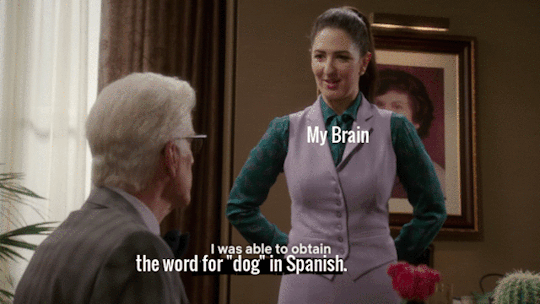
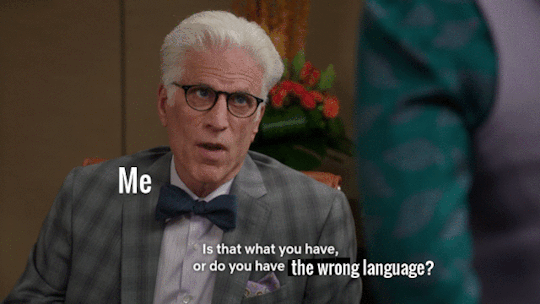
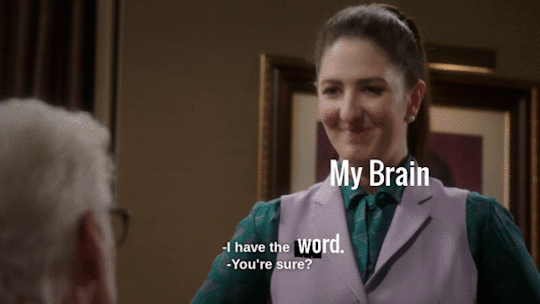
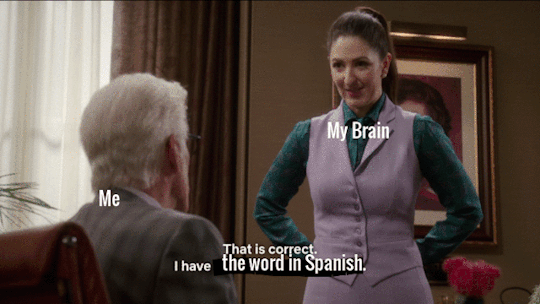
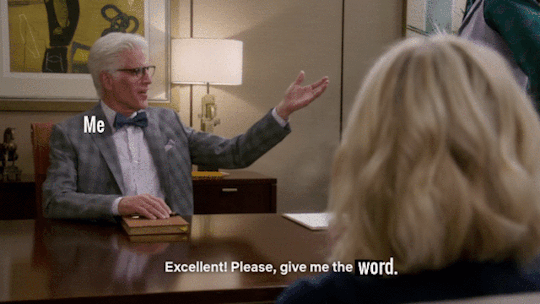
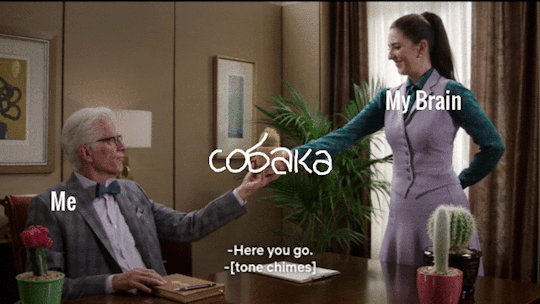

#language learning#had this idea when i could only think of the finnish word#but figured Russian would be more obviously wrong#for sharing in a simple meme
25 notes
·
View notes
Photo
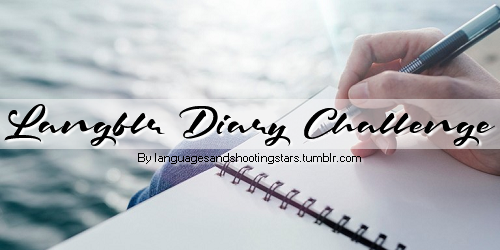
Hello! Back at it with a new langblr challenge! This challenge is called Langblr Diary Challenge and the purpose of it is to improve your language skills by writing a diary!
To participate in this challenge you have to keep a diary in your target language for one month (29-31 days). If you want, you can post (a picture of) your diary entry and ask for corrections for native speakers. Alternatively you can just write a brief summary of what you wrote, how many words/sentences you wrote, what new words and/or grammatical structures did you learn, etc. If you do, please tag your post as #langblrdiarychallenge so that I and others can see what you’ve done and get inspired as well!
Good luck!
Ps. If you get tired of writing about your day over and over again google some writing prompts!
306 notes
·
View notes
Text
The First Infinitive
I don’t why I haven’t studied this before! It’s right here on the Finnish Teacher website. But anyway, I came across “muistaakseni” in a YouTube video, and wanted to learn about this form… and it seems SO HANDY.
How To Form
Basic form of verb + kse + possessive ending, such as
syödä + kse + ni = syödäkseni
muistaa + kse + si = muistaaksesi
laihduttaa + kse + en = laiduttaakseen
löytää + kse + mme = löytääksemme
yne.
The result is some amazingly handy phrases:
Muistaakseni - As far I can remember
Tietääkseni - As far as I know
Ymmärtääkseni - As far as I understand
Nähdäkseni - As far as I can see (metaphorically see, same as English)
How to Use
Then in general this is used to explain WHY you are doing something.
Minä puhun suomea kotona oppiakseni nopeasti. - I am speaking Finnish at home in order to learn quickly.
Hän juoksee joka päivä laihduttaakseen. - He runs every day in order to lose weight.
Mennään kouluun aikaisin huomenna puhuaksemme opettajan kanssa. - Let’s go to school earlier in order to speak with the teacher.
I just made up those example sentence, so sorry if there are mistakes!!
24 notes
·
View notes